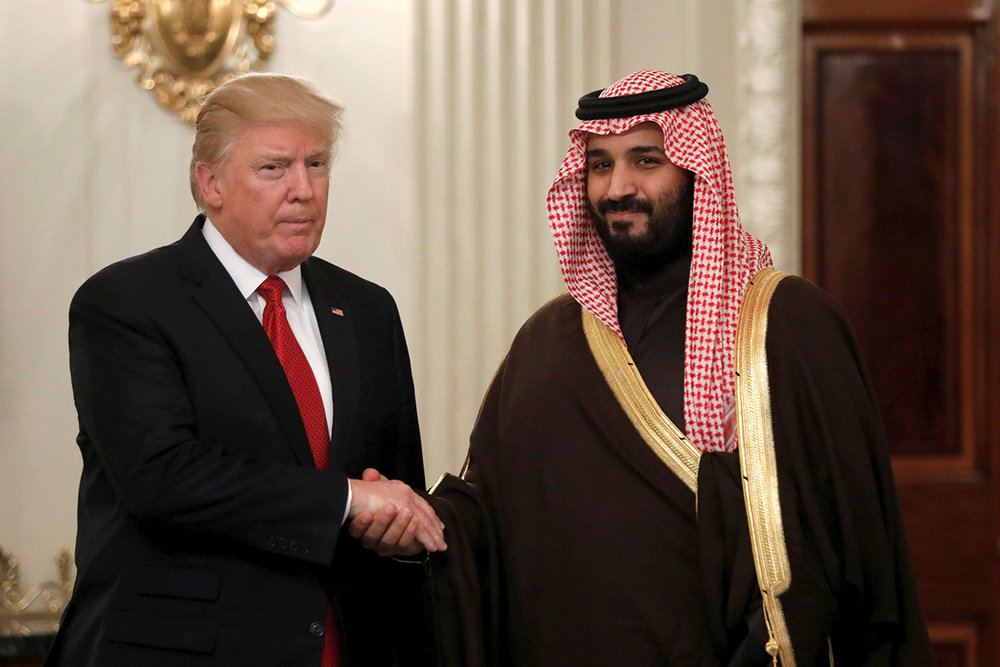Persian Gulf Arab states including Saudi Arabia oppose potential US attack on Iran Guardian
Persian Gulf Arab states, including Saudi Arabia, oppose potential US attack on Iran: Guardian
TEHRAN - In a commentary on March 31, the British newspaper the Guardian wrote an article saying that the Persian Gulf Arab states are opposed to a possible U.S. attack on Iran’s nuclear facilities, believing it will make the Middle East region more insecure.

“Widespread rejection in the (Persian) Gulf of a U.S.-inspired attack on Iran’s nuclear facilities is a relatively new factor in the equation, and Trump’s plan to reportedly visit Saudi Arabia on his first overseas trip means he may personally hear strong opposition to an attack on Iran from the Saudi crown prince, Mohammed bin Salman,” the Guardian wrote.
The following is the text of the article titled “Trump’s bombing threat over Iran nuclear programme prompts backlash”:
Iran has reacted with outrage after Donald Trump said the country will be bombed if it does not accept U.S. demands to constrain its nuclear program.
The U.S. president said on Sunday that if Iran “[doesn’t] make a deal, there will be bombing. It will be bombing the likes of which they have never seen before.”.
Trump’s latest threat – more explicit and violent than any made before – came after he sent a letter to Iran, as yet undisclosed, offering to hold talks on its nuclear program. Iran had sent a reply to the U.S. stating it was willing to hold indirect talks, officials confirmed.
Esmail Baghaei, the Iranian foreign ministry spokesperson, said of Trump’s threat: “The explicit threat of bombing Iran by the head of a country is clear contradiction to the essence of international peace and security.
“Such a threat is a gross violation of the United Nations charter and a violation of the International Atomic Energy Agency safeguards regime. Violence brings violence and peace creates peace, America can choose.”
“Such a threat is a gross violation of the United Nations charter and a violation of the International Atomic Energy Agency safeguards regime. Violence brings violence and peace creates peace, America can choose.”
The Leader, Ayatollah Ali Khamenei, a sceptic about talks with the U.S., said Iran was “not overly concerned” by Trump’s words. “We consider it unlikely that such harm would come from outside. However, if any malicious act does occur, it will certainly be met with a firm
and decisive response,” he said.
Brig. Gen. Amir Ali Hajizadeh, the commander of the Revolutionary Guard’s aerospace force, said: “Someone in glass houses does not throw stones at anyone,” adding: “The Americans have at least 10 bases with 50,000 troops in the region, meaning they are sitting in a glass house.”
But the Iranian foreign minister, Abbas Araghchi, clearly had authority to keep the prospect of talks alive, saying Iran had already replied to the Trump letter through intermediaries in Oman and adding he knew the Iranian letter had now reached the U.S. Araghchi said direct talks were not possible while the U.S. continued to threaten and bully Iran.
Trump sent his original letter proposing talks through the United Arab Emirates’ senior diplomatic envoy, Anwar Gargash.
Trump has set a deadline of mid-May for progress to be made, but a longer deadline also exists of mid-August, by which time the original 2015 nuclear agreement will largely expire and a European response will be required. Trump took the U.S. out of that agreement in 2018, a move widely seen as a mistake since it led Iran to speed up its uranium enrichment program.
That Iran sent its reply through Oman, its traditional chosen mediator, rather than the UAE may suggest Iran does not want the UAE – which has normalized relations with Israel – to act as intermediaries. The U.S. and Iran had held indirect talks on reviving the nuclear agreement under the Biden administration in Vienna from 2021, but they fizzled out, and all sides agreed the indirect nature of the talks ate up time, something Trump is reluctant to offer Iran.
Some of the ground will have been covered in four rounds of parallel talks held between Iranian and European negotiators in Geneva.
Tehran has not commented on how broadly the Trump letter went in demanding concessions from Iran. But the Iranian ambassador to Iraq, Mohammad Kazem al-Sadegh, indicated the U.S. was seeking talks that went wider than the nuclear program, saying the letter called for the disbandment of the Iranian-backed Iraqi Popular Mobilisation Forces militia.
The U.S. administration has been divided over whether to simply demand Iran expose its civil nuclear program to fuller international inspection, or make a wider set of demands including a complete end to its nuclear program and an Iranian commitment to stop backing resistance groups in the Middle East such as Hamas in Gaza and the Houthis in Yemen.
The U.S. national security adviser, Mike Waltz, has called for the “full dismantlement” of the Iranian nuclear program, something Tehran rejects. By contrast, Steve Witkoff, Trump’s special envoy, spoke only of restricting Iran’s nuclear program, something Iran has been willing to accept since 2015 so long as it leads to a lifting of sanctions on the Iranian economy.
Kamal Kharazi, the head of Iran’s Strategic Council on Foreign Relations and sometimes touted as a chief negotiator, has accused the U.S. of operating a psychological war by adopting a policy of “either war or negotiation”.
Widespread rejection in the Persian Gulf of a U.S.-inspired attack on Iran’s nuclear facilities is a relatively new factor in the equation, and Trump’s plan to reportedly visit Saudi Arabia on his first overseas trip means he may personally hear strong opposition to an attack on Iran from the Saudi crown prince, Mohammed bin Salman.
The Persian Gulf’s opposition to an attack on Iran is based not on close ideological affinity with Iran, but on a sense the region must avoid further political instability.
source: tehrantimes.com